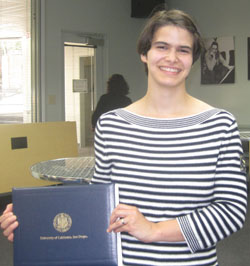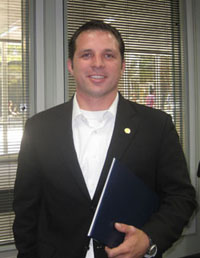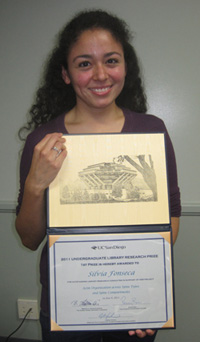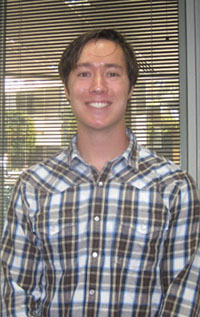Four UC San Diego Undergraduates Receive Undergraduate Library Research Prize
Undergrads demonstrate their stellar research skills in using library resources
By:
- Dolores Davies
Published Date
By:
- Dolores Davies
Share This:
Article Content
Four undergraduate students at the University of California, San Diego have received the 2011 Undergraduate Library Research Prize for their outstanding research skills. The prize, which is co-sponsored by the UC San Diego Libraries, the Vice Chancellor for Student Affairs, and the UCSD Alumni Association, includes cash awards of $1000 and $500 for first and second place.
“The UC San Diego Libraries are pleased to recognize this year’s Library Research Prize award-winners,” said Brian E. C. Schottlaender, the university’s Audrey Geisel University Librarian. “They clearly demonstrated the outstanding research skills needed to excel at a major research university like UC San Diego. Their astute and strategic use of a diversity of library resources, from specialized databases and library bibliographic tools, to electronic journals and manuscript collections, was impressive.”
To be considered for the Undergraduate Libraries Research Prize, students are required to be nominated by faculty and participate in either the annual UC San Diego Undergraduate Research Conference held in the spring or in other university programs that foster and recognize student research and scholarship. The Undergraduate Research Conference, sponsored by Academic Enrichment Programs (AEP), a unit of Student Educational Advancement under Student Affairs, is one of three major undergraduate scholarly meetings that AEP coordinates each year that afford students from all academic disciplines the opportunity to present findings of research conducted under the guidance of UC San Diego faculty members.
“The winners of this year’s Undergraduate Library Research Prize reflect the high academic standards which UC San Diego has become known for,” said Penny Rue, UC San Diego’s Vice Chancellor for Student Affairs. “Students come here to study and learn from our award-winning faculty but at UC San Diego, they also have a wealth of opportunities to work alongside faculty researchers and participate directly in the research process. I’m very pleased to see how skillfully students are tapping into the vast knowledge and information resources offered by the UC San Diego Libraries.”
“Undergraduate scholarship is a vital part of the student experience at UC San Diego,” said Armin Afsahi, Assistant Vice Chancellor for Alumni Affairs. “Superior research skills will benefit our students not just in their lives at UC San Diego, but in their careers and daily lives, long after they’ve graduated. I’m pleased that UCSD Alumni can play a role in honoring these impressive student achievements.”

Alicia Kulikowski, 1st place Social Sciences/Arts & Humanities
In the social sciences, arts, and humanities, first prize went to Alicia Kulikowski for her work on the United States and the Genocide Convention ratification debate. A Warren College history major, Kulikowski was nominated by Patrick Patterson, a professor of history. Her research project analyzes the limits of the United States’ participation in the active development of international human rights law as characterized in its Genocide Convention ratification debates, which span several decades.
“Alicia has tremendous potential for future scholarly achievement and, already, has a great record of research accomplishments,” said Patterson, who first met Kulikowski in 2009 when she learned of their shared interests in international human rights. “Her research is not just of great merit, but of great importance as well. The subjects she explored were, in many ways, cutting-edge and hotly disputed issues in the international legal community; they promise to become only more important in the future.”
Kulikowski consulted an impressive range of print and electronic materials in conducting her research, from Senate documents, presidential papers, and executive orders, to scholarly literature and various databases such as the Congressional Record.
“This research project has given me an exceptional inside look at federal-level decision making and legal reform processes,” said Kulikowski. “The UC San Diego Libraries’ physical and electronic resources were absolutely essential to my work. I also learned a great deal from the Libraries’ Government Information Librarian, Rebecca Hyde.

Kevin Staight, 2nd place Social Sciences/Arts & Humanities
Second prize in the social science, arts, and humanities division went to Kevin Staight, who was nominated by UC San Diego Economics Professor Ross Starr, for his research on the effects of high-frequency trading. A senior at Eleanor Roosevelt College with a double major in management science and linguistics, Staight’s project focused on how computer algorithmic trading is shaping the landscape of investment.
“Kevin’s essay is a tour de force on intensive analysis of a voluminous body of economic data, provided by the UC San Diego Libraries,” said Starr. “Kevin’s ambitious undertaking, which made extensive use of library resources, was to master literally billions of data points and then develop computational techniques to analyze the raw data for indications and implications of high-frequency trading.”
Staight, who studied economics in Syria in 2010, said he would not have been able to complete his research without the graduate-level access to the Wharton Research Data Services (WRDS) and Global Financial Data databases provided by the UC San Diego Libraries. The WRDS provides second-by-second trade and quote data on security prices and transactions on U.S. securities exchanges.
“My paper is on such a new topic that there are not many references in print that deal directly with high-frequency trading,” said Staight. “I had great coaching from Adele Barsh (UC San Diego economics and business librarian) and was directed to a number of online references that were especially useful. Without the specific sources and datasets available through the UC San Diego library system and the help of the dedicated staff at Geisel Library I would not have been able to complete this research.”

Silvia Fonseca, 1st place Life Sciences/Physical Sciences
In the life and physical sciences, Silvia Fonseca, a Warren College senior majoring in biochemistry and cell biology with a minor in psychology, received first prize for her research on actin organization across spine types and spine compartments. Her project focused on dendritic spines, which are specialized structures on neurons and play a critical role in biochemical signaling in the nervous system. Fonseca, a graduating senior bound for medical school, was nominated by UC San Diego Neurobiologist Shelley Halpain.
“Sylvia is clearly one of the best undergraduate students we’ve ever trained in our laboratory,” said Halpain. “Her experimental data are so interesting and compelling that she will co-author a paper with me later this year. She has become highly familiar with the scientific literature and this has helped her become increasingly sophisticated in her scientific thinking. Paramount to this demonstration of scholarship has been Sylvia’s exemplary success in learning how to perform a literature search and extract key scientific information.”
In her research, Fonseca made extensive use of PubMed, the comprehensive biomedical literature database. Her astute search strategies and identification of appropriate keywords helped her find the most appropriate literature.
“I utilized electronic journal subscriptions from the UC San Diego Libraries for the majority of my searches,” said Fonseca. “I first had to do a lot of reading to get a deeper understanding of dendritic spines. As I got further and further into my research, I utilized PubMed as I helped design and modify experiments. Through this process of reading through the scientific literature, I have learned to come up with my own questions, which has given me a feel for what it is like to reason and analyze like a trained scientist.”

Christopher Berg, 2nd place Life Sciences/Physical Sciences
Christopher Berg, a premed student majoring in chemistry at Muir College, is the recipient of the second prize award in the life and physical sciences division. His research focused on the photophysics of carotenoid aggregates using fluorescence and resonance Raman spectroscopy. Carotenoids, of which there are more than 700 different types, are the most widespread pigments in nature and are crucial for photosynthesis and for protection against excess light. Berg was nominated by Michael Tauber, an assistant professor of chemistry and biochemistry.
“The literature on carotenoids is vast, and without the organization of the library, Chris or any researcher would be overwhelmed,” said Tauber. ”Very early in his work with my group, Chris learned to use a variety of tools available through our Science & Engineering Library. His scientific maturity has now reached a level where he is co-author on a manuscript that treats the resonance Raman spectroscopy of the same aggregates.”
The library research “spark” was lit for Berg when UC San Diego Chemistry Librarian Teri Vogel was a guest lecturer in his physical chemistry class. Armed with the knowledge he gained from that lecture, Berg was able to exploit the Libraries’ resources to complete his lab assignments and eventually, undertake a challenging research project and co-author two scientific articles.
“Without the subscriptions that the UC San Diego Libraries provide for students and other researchers, the work done by other scholars around the world would either be unknown or only obtainable at a great price,” said Berg. “Throughout my experience as a researcher, I learned the different roles that primary sources such as research articles, and secondary sources like reference textbooks, have in gathering information. I can distinctly recall Professor Tauber quoting Isaac Newton—‘We stand on the shoulders of giants’—with respect to the progress already made in the field of molecular photophysics. Reading articles every day, I am reminded that science is the cumulative knowledge gained throughout the years.”
According to Catherine Friedman, Associate University Librarian for User Services, who oversees the Library Research Prize contest, this year’s winners were very astute in using the expertise of research librarians and archivists who can save them multiple steps in their research efforts.
All entrants, said Friedman, must be nominated by UC San Diego faculty members and are judged based on: the significance of library materials used, including print, electronic, and primary resources; demonstrated expertise in mining library collections, including identifying, evaluating, and synthesizing a variety of materials in the generation of research; and evidence of significant personal learning and the development of substantive research and inquiry skills over time.
According to David Artis, director of Academic Research Programs and Dean of Undergraduate Research Initiatives, more than 130 UC San Diego undergraduates reported their research findings at the 2011 conference. A large crowd of family, friends, lab partners, and mentors attended the all-day event in support of the undergraduate participants. Members of the audience listened attentively and often engaged the undergraduate scholars in lively question and answer sessions after the respective 15-minute oral presentations.
With increasing regularity, undergraduates at UCSD and other selective and demanding colleges and universities act as research assistants to faculty members and with faculty mentors, said Artis. The students contribute to the generation of new knowledge on topics of local, national, and global interest. At UCSD’s most recent conference, students presented research findings on a wide range of subjects, including: the effects of high frequency trading; examinations of treatments for lymphoma, thyroid cancer, and cerebral palsy; microfinance; San Diego’s water supply; the future of U.S.-Korea relations; and effective public health campaigns, among other topics.
Ranked among the nation’s top 20 public academic research libraries, the UC San Diego Libraries play an integral role in advancing and supporting the university’s research, teaching, and public service missions. As the intellectual heart of the UC San Diego campus, the university libraries provide access to more than 7 million digital and print volumes, journals, and multimedia materials to meet the knowledge and information needs of faculty, students, and members of the public. Each day, more than 7,300 patrons visit one of the UC San Diego libraries and the libraries vast resources are accessed nearly 90,000 times through the Libraries’ main Web site.
Share This:
You May Also Like
Stay in the Know
Keep up with all the latest from UC San Diego. Subscribe to the newsletter today.



